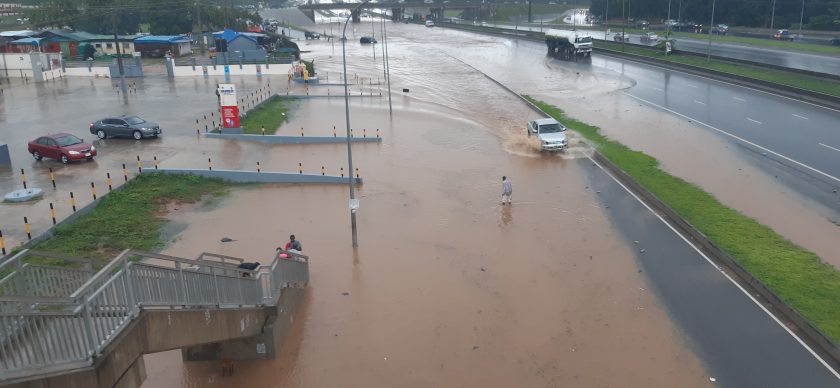Flooding disasters are serious problems in the communities that experience their devastating effects.
The Americas, Asia and even Europe recently came under the destructive force of this disaster which left in its wake the destruction of lives and property as well as damages to public infrastructure.
The disaster underscored with stunning clarity how vulnerable even the advanced worlds are to extreme weather conditions that the man-made climate crisis and other activities are bringing.
According to reports, many residents got drowned in their cars or in basement apartments as flash floods struck several regions, causing water to overtake residential buildings, subways and streets.
Similar incidents also occurred here in the Federal Capital Territory (FCT), most notably at the Trademore Estate in Lugbe where the flooding disaster wreaked serious havoc on the estate, killing some persons and destroying properties and infrastructure.
In Kwali Area Council also, the problem of flooding has been a recurring feature with farmlands, residential houses and most recently a bridge connecting Dafa, Tunga and Gwomani communities washed away by flood.
Although the much talked about climate change has been blamed for the recent flooding in the FCT and indeed many parts of the world, there are, however, other human-related activities that are equally responsible for this situation.
According to the FCT Administration, flooding in some estates in the FCT are a result of housing developers not following laid down building regulations as provided in the district design.
A Ministerial Committee set up by the FCTA to assess the causes of flooding in parts of the city revealed in its reports that structures are wrongly erected on waterways by housing developers, either causing the diversion of the natural course of rivers or substantially narrowing their pathway, resulting in flooding.
According to the Committee’s report, the FCT District Masterplan recognises the floodplains and waterways and ensures that they are not obstructed in any way. In this regard, the erection of structures is only permitted at least 40 metres away from river courses (20 metres on either side of the river), to ensure free flow of water.
However, what has been discovered by the authorities is that housing developers in flagrant disregard of this regulation in the FCT would often erect structures along the path of water during the dry seasons and sell them off to unsuspecting off-takers who are then faced with the problem of flooding when the rains return.
The Head Operations, National Emergency Management Agency (NEMA), Mr Johnson Uwazuruonye also corroborated this point in a recent media chat on the issue of flooding in the FCT. According to the disaster manager, until Estate developers and Nigerians, in general, change their attitude towards the indiscriminate building of houses on flood plains, flooding will continue to ravage communities.
Other human-related activities that have also been blamed for the recurring flood in the FCT and its Area Councils include the indiscriminate dumping of refuse in drainage channels and farming on river banks.
The effects of these human-related activities have necessitated the call for attitudinal change towards the environment to forestall the problem of flooding in the FCT.
Consequently, human actions that obstruct the natural flow of rivers, block drainages and exacerbate erosion are chief among the activities that must be discouraged in the FCT.
In this regard, it has become a matter of priority for developers and other residents in the FCT to shun further violation of laid down environmental and developmental laws in the FCT.
To ensure compliance with sensitization messages, by regulatory authorities, traditional rulers in the FCT also have a major role to play in educating their subjects and emphasizing safety issues, especially human activities that increase vulnerability to flooding and other forms of disaster.
Residents should also be encouraged to always carry out due diligence and find out from the relevant authorities in the FCTA if developers have met the master plan requirements before buying houses or taking possession of properties to avoid falling prey to the antics of unscrupulous developers.
As the regulatory authority in the territory, the FCT Administration must also step up its enforcement and regulatory activities in order to ensure that acts that constitute violations of the district master plan are nipped in the bud before they become a major problem.
In the unfortunate situations that vital infrastructures like link bridges, access roads and flood channels are destroyed by flooding incidents, the Administration must move speedily to remediate the situation and forestall further hardship on the communities where they have occurred.
Lastly, the NEMA, security agencies, the Abuja Environmental Protection Board (AEPB) and other first responders must be alive to their duties in the areas of risk prevention initiatives and emergency preparedness capabilities to ensure that rescue efforts are timely during emergencies. All these are very necessary steps that must be taken in the FCT to mitigate the dangers of flooding and the attendant destruction of lives and properties.
Danladi Akilu wrote in from Gudu District, Abuja

 Join Daily Trust WhatsApp Community For Quick Access To News and Happenings Around You.
Join Daily Trust WhatsApp Community For Quick Access To News and Happenings Around You.


